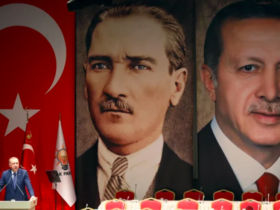Following a referendum in October 2020, a Constitutional Assembly was established in Chie, whose members were elected by the population in May 2021. The Assembly has the task to develop a draft for a new constitution, which after being approved by the Assembly itself, will be presented to a referendum. This is expected for 2022.
Left-wing candidate Gabriel Boric won the recent presidential elections. In contrast to his competitor, Boric is considered to be a supporter of transformation with the new constitution.
Below we present the article of Claudia Iriarte Rivas, Chilean professor for law, who examines the contemporary work on the constitution in the context of Chile’s constitutional tradition and Allende’s reform attempts.
The article was presented to the Congress “Political Parties and a new society”, organized by the Labor Party in Mexico in October 2021. Translation from Spanish was provided by Yunus Soner.
By Claudia Iriarte Rivas*
The constituent process, in which Chile is immersed, implies the elaboration of a new constitutional text. That is, the elaboration of a new social pact, in which we Chileans will be able to establish the principles that structure a new constitutional order.
The presented and debated proposals and the constitutionally adopted model are of fundamental importance, since from these the constitutional order for the following decades in Chile will be established.
The new constitutional order must be built on the basis of the proposals of the constitutionalism of the welfare state. This doctrine and regulatory approach is not new in Chile. It was already established in the 1925 Constitution in force until September 1973, when a coup d’état was committed against the Government of Salvador Allende and the Popular Unity.
In this sense, it is interesting to review the proposals contained in the bases of the constitutional reform, which was back then prepared by a commission of advisers to President Salvador Allende – a proposal that was also based on social constitutionalism but from a perspective focused on the working actors.
The latter seems to me to be a crucial issue, since the development of liberal (neo-liberal) ideas have so impregnated the social fabric that the notion of a working actor, as a citizen, as a subject of law, as a subject which expresses the legal social problem that derives from the capital-labor conflict, has been lost. And today I would like to recover it from a constitutional legal proposal perspective, which despite the fact that it was raised almost 50 years ago maintains its validity, and can even provide us with insights on new and enriching developments of the constitutionalism of the social State for the 21st century.
Constitutionalism of the Social State
The constitutionalism of the social State from the perspective of a critical constitutionalism proposes a model of constitutional development that allows the overcoming of the limitations of liberal law. Liberal constitutionalism is configured on the basis of a conception of a social order without conflicts and without contradictions. In practice, the primacy of the market as an economic market and a political market is enshrined, and it is ruled out that this primacy is called into question.
The constitutionalism of the social State, on the other hand, is structured on the premise that society is in permanent conflict – the basic component of society is not harmony but conflict – and that the Law and its institutions must account for it. To produce order, it is necessary to integrate the conflict into the constitutional order. Only in this way is it possible to advance towards articulation as a possible order.
For this reason, the Law must address social reality from a material point of view and consider, likewise, the subjects in material and historical terms. The institutional-normative proposal must be based in the same way on the basis of the material reality of the subjects (diversity) and particularly account for the conflicts, hierarchies, power relations and forms of subordination that exist between different (social) groups in the society and develop a legal institution to address and respond to this conflict regarding subordination, non-equality and discrimination that it implies.
Basically, the proposal of the constitutionalism of the social State means the approach (and conceptualization) of diverse constitutional principles with respect to liberal constitutionalism, such as the principle of solidarity. It also means new aims of the State, new rights and guarantees, and raises the programmatic nature of the constitution. All this supposes the acquisition of a promotional function and the expansion of its competences for the achievement of substantial equality (not only formal), surpassing the conception of liberal constitutionalism that limits the role of the State to the guarantee of rights (Guardian State). The challenge now is greater; the State must promote conditions and remove obstacles for the effective and not just formal enforcement of rights. Thus, the State is endowed with broad powers, which is expressed in the legalization of the social State society.
This model of the social state produced, at its time, such a transformation in law in general and in constitutional law in particular that it implied changes in the system of rights and guarantees. This considers the material subjectivity of diverse subjects and their social configuration. The foregoing supposes the approach of new rights: economic and social rights, to which cultural rights were later added and, at present, environmental rights and collective rights – of peoples, such as indigenous peoples, and we could even consider of human collectives structured on the basis of common identity. It also involves the reconfiguration of existing rights, such as the configuration of the social role of property that determines the exercise of individual property rights, and, finally, the modification of the guarantee system. The model also contains a proposal that means rethinking the link between the public sphere of rights and the private sphere of the market, so that the conception of the former permeates the latter in relation to matters of social conflict, configuring a public dimension regarding realities and properly private legal relationships.
The constitutionalism of the social State gives the constitution a programmatic character, which allows the states to advance, with greater or lesser success, in the consolidation of the social state, expressed in its structuring principles, the purposes of the State and the consolidation of a system. rights and guarantees configured on common, equitable and egalitarian bases for all members of society, in order to guarantee the recognition, enjoyment and exercise of rights and freedoms.
The Chilean Constitution of 1925 was structured on the basis of liberal constitutionalism and social constitutionalism at the same time, thus opening a path of social change, transformation and progress towards the deepening of democracy. It was based on solidarity as a constitutional principle, which implied establishing new goals of the State and the recognition of economic and social rights not present in the Chilean constitutional order until that date.
Specifically, the right to work was established, the right to social security, the right to education – it established basic education as compulsory -, the right to health (instituting the creation of a national health service – in 1952, promoted by Senator Salvador Allende, the National Health Service was created) and the right to housing, established in the idea of promoting family property and ensuring healthy living spaces. In addition, it established the social role of property when it indicates that the State will promote the appropriate division of property and the constitution of family property (Article 16, section 2).
The social role of property, delimited with greater clarity and conceptual depth in successive reforms, between 1962 and 1971 – thus manifesting the programmatic nature of the Constitution of 1925-, was conceptualized in the Constitution as follows: “The social function of property includes response to the general interests of the State, the needs and health of the public, the best use of the resources and productive energies in the service of the community and the elevation of the general living conditions of the population.” (Article 10 inc.2). The recognition of the social role of property allowed carrying out the agrarian reform (in its various stages) and the nationalization of the large copper mining industry in 1971. It also allowed the constitutional foundation of the legislation on which the nationalization of banking and the creation of the social area of the economy, during the government of President Salvador Allende.
The Constitution of 1925 according to its original text and the successive reforms that were introduced was a faithful expression of the constitutionalism of the social State. Its provisions fully expressed the programmatic nature assigned to the constitutional text, a program that was in full swing, promoting and allowing changes to advance the deepening of democracy in Chilean society. Process that was abruptly curtailed with the civil military coup in 1973.
“My proposal to the Chileans: A democratic and sovereign state ”
In 1972 Salvador Allende created a working commission to prepare the bases of the project to reform the Constitution. This project was left unfinished; the complete text that had been prepared was lost after 1973. Eduardo Novoa Monreal, President Allende’s main legal adviser, managed to partially reconstitute it on the basis of his own files and notes.
Beyond its historical value, this project is interesting for what it represents and the social, political and legal ideology that it reflects. Continuation of the Constitution of 1925, insofar as it is anchored in an important way in the approach of social constitutionalism, but deepening in a conception of social development based on solidarity, national sovereignty (social, political and economic) and force creator of workers.
In the first chapter it determined as structuring principles of the constitutional order the principles of freedom, equality, solidarity and justice, which determine as a new purpose of the social and political organization the construction of a society, which, based on these principles, “assures development integral and worthy of human personality as a consequence and common enjoyment of natural resources and fundamental production goods…”
The same regulations referred to the Republic, not only as a national entity, but also proposed it integrated into the Latin American community and the universal community as a free, sovereign and economically independent country. That is, it recognized the identity of Chile in Latin America and its insertion in the world context, but from the configuration of a sovereign and free nation, politically and economically.
It proposed a system of rights and guarantees based on the international human rights system, in respect of which it obliged the State to “create and maintain appropriate objective conditions that allow these rights to have a real validity.” It set up new rights. Those that were constituted to enable the “most complete human fulfillment” of workers both as individuals and as a collective subject. It also proposed the strengthening of the family as a unit of socialization and social construction of the subjects, which should allow the development of citizens aware of their civic responsibility. In this regard, it is important to note that the family was defined and approached as an egalitarian and non-hierarchical social unit, explicitly declaring the full equality of men and women.
The right to work was proposed as a structuring right of the rights system. Right to work that was conceptualized in an important way in the guarantee of access to quality, decent and justly remunerated work, in order to cover the needs of housing, clothing, education, recreation and rest. This right was guaranteed by the “Social Ownership of the means of production of state companies and their dynamic function, by the mixed area of the economy and cooperative ownership.”
Work and the “working subject” were, as has been seen, central notions of this proposal. Around these, not only the constitutional principles and the system of guarantee rights were structured, but also the entire constitutional institutionalism. Particularly noteworthy is the reference to the concept of worker established in its regulations, expressly stating: “Worker: Producer of goods and services through his personal and direct action on the means of production. The workers are manual or intellectual … No one who benefits from the surplus value of someone else’s work can be considered a worker. No person who carries out their activity for speculative purposes can be considered a worker ”.
Many of these approaches follow the conception and language typical of that time, but the underlying doctrinal ideas and conceptions are absolutely valid and current for the current debate on a new Constitution for Chile.
* Lawyer, doctor of law and professor at the Law School of the University of Chile.

















Leave a Reply